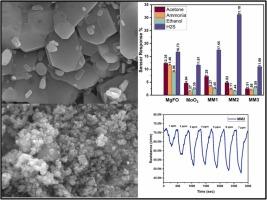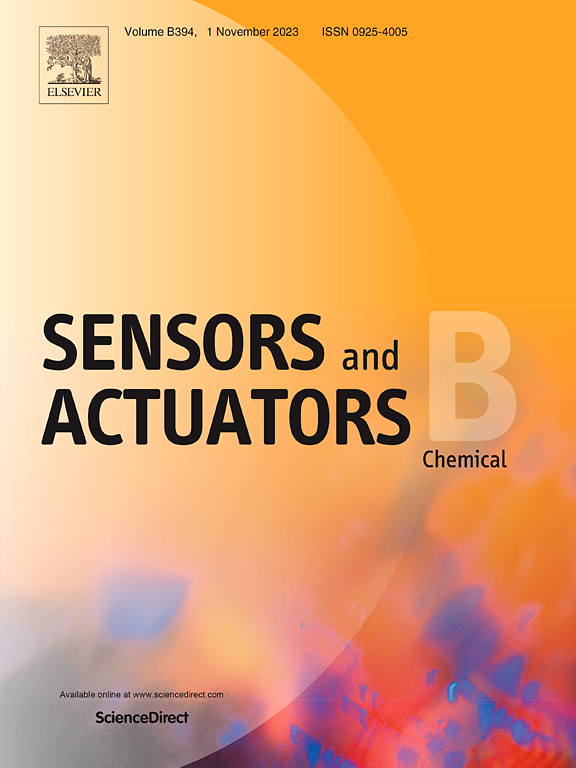用于 H2S 传感的异质结构纳米复合材料 MgFe2O4/MoO3 的合成:利用 DFT 的实验和理论方法
IF 3.7
1区 化学
Q1 CHEMISTRY, ANALYTICAL
引用次数: 0
摘要
低温条件下的高选择性硫化氢(H2S)气体传感器至关重要。通过简便的共沉淀、水热和固态混合方法,制备了镁铁氧体(MgFe2O4)和氧化钼(MoO3)的纳米复合材料,以提高 H2S 的气体传感性能。通过 X 射线衍射 (XRD)、场发射扫描电子显微镜 (FESEM) 和 X 射线光电子能谱 (XPS) 对其晶体结构、表面形貌和元素组成进行了检测。制备的纳米复合材料 MM2(20% MoO3)具有 54.225 m2/g 的较大表面积和介孔结构。MM2 纳米复合材料在 135 ℃ 下对 7 ppm H2S 的气体传感响应增强了 31.18%,是 MgFe2O4 在 135 ℃ 下响应的 1.86 倍。n-n 纳米复合材料的协同效应、纳米片与纳米颗粒的结合以及高表面积使传感性能显著提高。本文还将实验数据与密度泛函理论(DFT)结果进行了比较。本文章由计算机程序翻译,如有差异,请以英文原文为准。

Synthesis of heterostructured nanocomposite MgFe2O4/MoO3 for H2S sensing: Experimental and theoretical approach by DFT
A highly selective hydrogen sulfide (H2S) gas sensor at low temperatures is crucial. A nanocomposite of magnesium ferrite (MgFe2O4) and molybdenum oxide (MoO3) was prepared through facile co-precipitation, hydrothermal, and solid-state mixing methods to enhance gas sensing performance of H2S. The crystalline structure, surface morphology, and elemental composition were examined through X-ray diffraction (XRD), Field emission scanning electron microscopy (FESEM), and X-ray photoelectron spectroscopy (XPS). A larger surface area of 54.225 m2/g with a mesoporous structure was observed for the fabricated nanocomposite MM2 (20 % MoO3). An enhanced gas sensing response of 31.18 % for 7 ppm of H2S at 135 °C was measured for MM2 nanocomposite and exhibited 1.86 times greater response than MgFe2O4 at 135 °C. The synergistic effect of n-n nanocomposite, combination of nanosheets with nanoparticles, and high surface area attribute to a significant improvement in sensing behavior. This article also compared the experimental data with Density Functional Theory (DFT) results.
求助全文
通过发布文献求助,成功后即可免费获取论文全文。
去求助
来源期刊

Sensors and Actuators B: Chemical
工程技术-电化学
CiteScore
14.60
自引率
11.90%
发文量
1776
审稿时长
3.2 months
期刊介绍:
Sensors & Actuators, B: Chemical is an international journal focused on the research and development of chemical transducers. It covers chemical sensors and biosensors, chemical actuators, and analytical microsystems. The journal is interdisciplinary, aiming to publish original works showcasing substantial advancements beyond the current state of the art in these fields, with practical applicability to solving meaningful analytical problems. Review articles are accepted by invitation from an Editor of the journal.
 求助内容:
求助内容: 应助结果提醒方式:
应助结果提醒方式:


